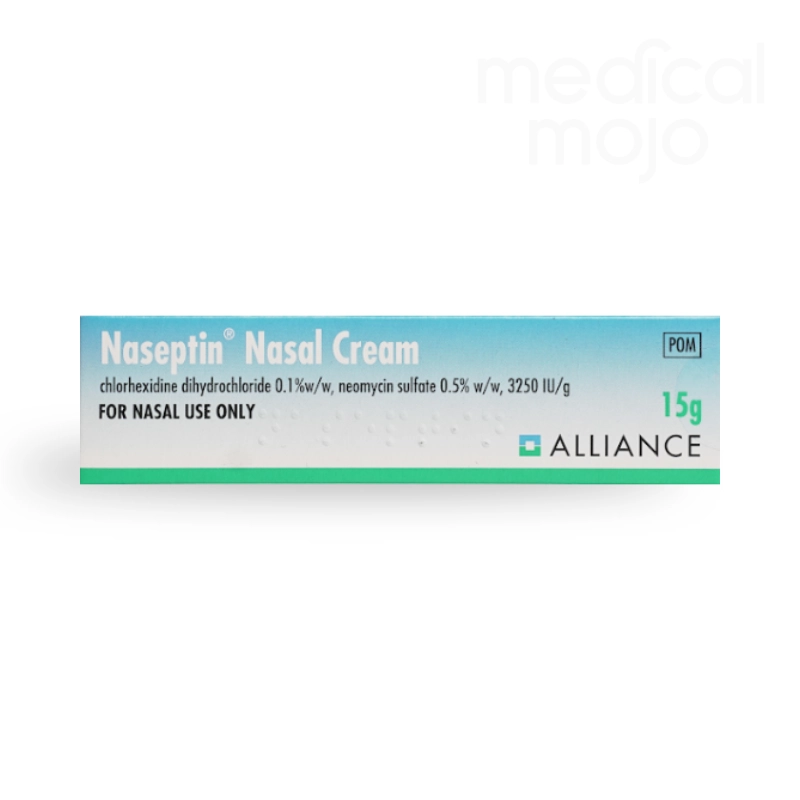Nasal infections: symptoms, causes, and treatments
A nasal infection will produce symptoms such as pain, inflammation, and soreness in the nostrils and surrounding skin. Such infections may also present with symptoms like fever, fatigue, and a blocked nose. In addition some individuals may also experience bad breath, loss of smell, or a persistent cough, particularly at night. Occasionally, the infection can spread to the skin around the mouth, leading to painful crusting and scabbing. OK, so that’s the bad news out of the way, the good news is that nasal infections are relatively easy to treat. Nasal infections can be resolved with the use of antibiotc creams for local application. Medical Mojo, we’re here to offer the treatments and support you need to effectively manage nasal infections and help you return to your best health.
What is a nasal infection?
Bacteria are opportunists, they are everywhere around us and even within us. They are always probing the body for weakness. So, when there is damaged tissue in or around the nostrils, a nasal infection can develop. When infected, the nose often feels sore and may be painful to touch, with symptoms including pimples, crusting, and scabbing inside the nostrils. These infections are typically caused by a bacteria called Staphylococcus and are commonly treated with topical antibiotics.
Symptoms of a nasal infection
Nasal infections encompass various conditions, each with its own symptoms. Common symptoms include:
- Inflammation of the nose and nostrils
- Pimples inside or on the nose
- Soreness and pain when touching the nose
- Crusty, scabby skin around the nose
Unlike sinus infections, nasal infections typically do not cause a blocked or runny nose.
Types of nasal infections
1. Nasal vestibulitis
Nasal vestibulitis is an infection of the skin surrounding the nostrils, often caused by bacteria like Staphylococcus aureus. It can result from minor injuries such as nasal hair plucking, excessive nose blowing, or nose piercings. Symptoms include inflammation, pimples inside the nostrils, and scabbing.
2. Impetigo
Impetigo is a bacterial skin infection that often affects the face, especially around the nose and mouth. It presents as fluid-filled blisters that burst, leaving behind red, crusty sores. Impetigo is highly contagious but treatable with antibiotics.
Causes of nasal infections
The primary cause of nasal infections is the Staphylococcus bacteria, though other bacteria may also be responsible. Risk factors include:
- Trauma or irritation to the nasal vestibule
- Poor hygiene
- Exposure to irritants like smoke or pollution
- Pre-existing skin conditions (e.g., eczema)
- Weakened immune system
- Crowded living conditions
Diagnosis of nasal infections
Diagnosing nasal infections like nasal vestibulitis or impetigo usually requires a physical examination by a GP. The doctor will check for signs of redness, swelling, and crusting. In some cases, a culture test may be needed to identify the bacteria.
Treatments for nasal infections
Most nasal infections can be treated with a topical antibiotic cream like Bactroban or Naseptin, both of which are available from Medicalmojo.co.uk after completing an online questionnaire. A FREE follow up call will be made by one of our prescribers following any successful purchase of these two antibacterial creams.
Topical Antibiotics
- Bactroban (Mupirocin) Ointment: Commonly prescribed for bacterial infections like nasal vestibulitis. It helps to eliminate the bacteria causing the infection.
- Naseptin (Chlorhexidine and Neomycin): Another topical antibiotic that’s effective against Staphylococcus aureus and other bacteria that commonly cause nasal infections.
Application: Apply the ointment inside the nostrils as directed by your healthcare provider, usually twice daily for about 5-7 days
For more severe infections involving boils, both oral and topical antibiotics may be necessary. Applying a hot compress can help drain boils, but in some cases, surgical drainage might be required.
Complications of nasal infections
While nasal infections are typically mild, they can sometimes lead to complications, such as:
1. Cellulitis
An infection that spreads beneath the skin, causing redness, pain, and swelling. Immediate medical attention is required if symptoms are severe.
2. Nasal Polyps
Non-cancerous growths in the sinuses or nose that cause congestion, difficulty breathing, and loss of smell. They are usually treated with corticosteroid sprays or surgery in severe cases.
3. Cavernous Sinus Thrombosis
A serious condition where a blood clot forms at the base of the brain. Symptoms include severe headache, facial pain, and eye swelling. It requires urgent medical treatment.
When should you seek immediate attention for a nasal infection?
Red flags for nasal infections indicate the need for urgent medical attention as they may suggest complications or a more severe underlying condition. Here are some red flags to watch for:
- Severe pain or swelling: Intense pain or significant swelling in the nose or face, especially if it spreads to the cheeks or eyes, could indicate a spreading infection, such as cellulitis.
- High fever: A persistent or high fever may suggest that the infection is spreading beyond the nasal area or that it has become systemic.
- Vision changes: Blurred or double vision, difficulty moving the eyes, or pain around the eyes can be signs of cavernous sinus thrombosis, a rare but serious complication.
- Facial redness or warmth: Red, warm skin on the face or nose could indicate that the infection is spreading, potentially leading to cellulitis.
- Neurological symptoms: Symptoms such as confusion, severe headaches, dizziness, or slurred speech could be a sign that the infection has spread to the brain or other areas, requiring immediate medical intervention.
- Persistent or worsening symptoms: If symptoms of a nasal infection persist despite treatment or worsen over time, it may indicate that the infection is not responding to standard therapies and needs further evaluation.
- Recurring infections: Frequent or recurrent nasal infections may suggest an underlying condition that needs to be addressed, such as a weakened immune system or chronic sinusitis.
- Unusual discharge: Thick, green, or foul-smelling discharge from the nose, especially if accompanied by other red-flag symptoms, could indicate a more severe infection.
If you or someone you know experiences any of these symptoms, it’s crucial to seek medical attention promptly to prevent complications and ensure proper treatment.
Preventing Nasal Infections
To reduce the risk of nasal infections, consider the following preventive measures:
- Practice good hygiene, including regular hand washing and avoiding nose-picking.
- Avoid exposure to environmental irritants like smoke and pollution.
- Use a humidifier to keep nasal passages moist.
- Limit the use of nasal sprays to prevent drying out the nasal lining.
- Maintain a strong immune system through a healthy diet, regular exercise, and adequate sleep.
By taking these steps and seeking prompt treatment when needed, you can effectively manage and prevent nasal infections. At Medicalmojo.co.uk, we’re dedicated to providing the resources and support you need for a healthy, infection-free life.




